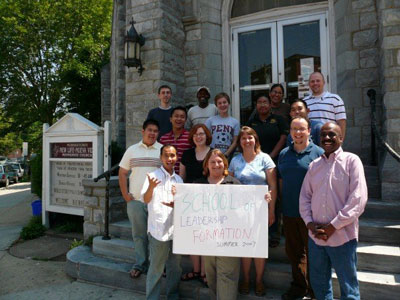Krista Ehst
kehst@mosaicmennonites.org

When considering what a typical Franconia Conference gathering might look like, most people familiar with the conference would probably not describe an intergenerational and multiethnic gathering in an urban meeting space. On Saturday, June 9th, this was indeed the picture as thirteen persons gathered for the first session of the School of Leadership Formation, held at Nueva Vida Norristown New Life, a Franconia Conference congregation in Norristown, PA, located just outside of Philadelphia.
Led by Franconia Conference staff Steve Kriss, Director of Communication and Leadership Cultivation, and Ertell Whigham, Director of Congregational Equipping and Resourcing, the School for Leadership Formation aims to better equip people for conference and congregational leadership roles. The school includes possibilities for equipping pastoral and congregational leaders while creating broader accessibility for all persons within Franconia Conference congregations to respond to their sense of call as leaders and contributors within the conference community and broader reign of God.
The School for Leadership Formation will likely take many forms, from providing graduate level studies, to holding workshops for young leaders, to meeting with individual congregations. No two persons or groups will participate in the same way, but the classes held this past Saturday will be a standard for everyone intending to serve in conference leadership roles. These classes, entitled “Called to God’s Work” and “Intercultural Leadership and Service,” exemplify the goals of this program.
Thirteen people met for this first training session, representing six conference congregations: Alpha (NJ) Mennonite, Franconia Mennonite (Telford, PA), New Beginnings Community Church (Bristol, PA), Nueva Vida Norristown New Life, Philadelphia Praise Center and Perkasie (PA) Mennonite. With an array of experiences, backgrounds, and ways of serving as leaders, the initial group found points of connection in their desire to serve within the Mennonite church.
Whigham led the first session, titled “Called to God’s Work,” using Isaiah 61:1-4 as a lens for discerning a personal sense of identity and calling in Christ. Several voices from the group led out in repeated readings of inspiring and challenging words: “The Spirit of the Lord God is upon me; because the Lord hath anointed me to preach good tidings unto the meek; he hath sent me to bind up the brokenhearted, to proclaim liberty to the captives…” With these words in the foreground, Whigham led out in a discussion of what it means to be called to God’s work, sharing his own perspective and experiences, but also allowing space for questions and varied experiences of the group to be shared. Isaac Landis, Jr. High Youth Minister at the Franconia congregation, found much value in this first session. “For me as a pastor, it was especially helpful to think again about calling and passion. These are things I thought a lot about during college, but now that I am in the ministry and into the day to day stuff, I don’t listen enough to God and what he is calling me to do and how he has called me.”
The very makeup of the group proved that being called to God’s work often means serving interculturally, which was the basis for Kriss’ session on “Intercultural Leadership and Service.” The group once again found a starting point in scripture, discovering how the story of the early church in Acts 2 & 11 offers possibilities for leadership within a diverse body of believers. Kriss invited the class to think about intercultural praxis, not only acknowledging or talking about intercultural churches, but allowing that reality to inform interactions within and between congregations. Alejandra Lopez, a member of the predominantly Indonesian Philadelphia Praise Center (PPC), found this section especially helpful in her quest to develop a Spanish-speaking ministry through PPC. “I really enjoyed the intercultural praxis section. I do so much with multiculturalism and feel that God has called me to break the barriers that arise in that area. Meetings like this are great ways to begin breaking some of those barriers.”
Conversations and learnings of the day were no doubt relevant to the changes and possibilities occurring within Franconia Conference’s 300 year-old community. “It is both scary and exciting,” Landis said, “to think about how the conference is changing and what that will mean for our future. If we truly want to be a missional people, then we will need to learn how to include persons who are not traditional Mennonites. Talking and thinking through these things was a good experience, and really got me thinking. How can we not only welcome these persons into our fellowship, but include them as brothers and sisters? What will it look like when our churches are filled not only with Moyers and Derstines, but with Moyers, Derstines, Lopezes, and Siahaans?”
The School of Leadership Formation exists to respond to these and other emerging questions and possibilities while embodying the Franconia Conference mission of “equipping leaders to empower others to embrace God’s mission.” Kriss believes that Franconia Conference has a hopeful future. “I am convinced that in our learning and listening together, we’ll continue to be formed and challenged by God’s calling and our interactions with people who transform our worldview.”
The opinions expressed in articles posted on Mosaic’s website are those of the author and may not reflect the official policy of Mosaic Conference. Mosaic is a large conference, crossing ethnicities, geographies, generations, theologies, and politics. Each person can only speak for themselves; no one can represent “the conference.” May God give us the grace to hear what the Spirit is speaking to us through people with whom we disagree and the humility and courage to love one another even when those disagreements can’t be bridged.
